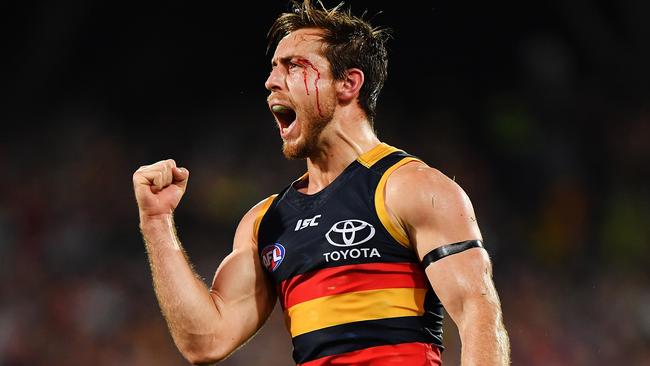
Along with Tippett, other Adelaide draftees who learned their trade in the AFL and showed great promise before deciding to leave the West Lakes nest that had raised them were Patrick Dangerfield (Geelong), Jack Gunston (Hawthorn), and Phil Davis (Greater Western Sydney). The Crows’ first 22 would have been the envy of the league if that quartet had stayed in Adelaide, but as it stands, they plague the team like

Similar to Scrooge’s Christmas reflections, their departure raised concerns about Adelaide as a place and the operations of the Crows. Adelaide seemed more affected than most, even though interstate recruits always talk about the “go home” factor with potential clubs during draft screening and in the initial days following their arrival.
This had a history predating the Dangerfield generation by many years. Players such as Nathan Bock, Chris Knights, Jonathan Griffin, and Kane Johnson left the Crows in search of lucrative contracts that would prepare them for life after football or for a home posting. Compounding Bock’s move to the Gold Coast was the decision by Davis, the man tipped to succeed him, to give in to pressure from GWS.
Gunston’s wish to go back to Melbourne caused a lot of controversy at the same time that he appeared to be developing into a forward with significant talent, and Adelaide’s prior nurturing work had paid off for the Hawks. Supporters of Hawthorn have started singing “You wish you had Jack Gunston” to the tune of “We Wish You a Merry Christmas.” Any administrator or fan of the Crows would tremble at that one. The quiet wingman David MacKay’s resignation in the same year that Gunston left was considered something of a minor miracle.
Tippett, of course, perfectly captured Adelaide’s intense annoyance at having to keep players. In a tale that was chronicled in newspaper back pages for far longer than anyone at West Lakes would have liked, Tippett’s short-term stay in Adelaide was paid for by the club heavily in staff bans and draft penalties before the Swans were able to sign him for no money at all from the Crows. It’s still the most humiliating moment in the history of the club.
There were two lessons to be learned at the time. Initially, it didn’t seem like much use to bend the rules to make room for players who didn’t want to stay in Adelaide. Second, players had become far more aggressive in their pursuit of home pastures or bigger contracts due to the market pressure created by Gold Coast and GWS joining the AFL. The Crows attempted to swim against the current, which caused them more injuries. They were caught in a powerful storm.

Ever since, efforts have been made to find and seek out calmer waters. Strangely, the relationships that draftees from outside South Australia have formed are what have allowed Adelaide to narrow their roster and improve at keeping players on it. As Daniel Talia put it, Adelaide is now a desirable place in which to grow together. Talia joined the Crows in 2009, the same year Tippett signed his fateful three-year contract extension.
A group that included Rory Sloane (Eastern Ranges), Rory Atkins (Calder Cannons), Tom Lynch (St Kilda), and Josh Jenkins (Essendon) was led by Talia (Calder Cannons). “It’s funny, a lot of the guys at the club now are from interstate and I feel like that’s really bonded us closer,” Talia said. “We’re a really close-knit group and one of our strong points is our culture, which we developed after the events of last year.
Guys want to come hang out and be a part of our great culture.” Except for Thommo [Scott Thompson] and Dougy [Richard Douglas] and the like, we don’t have many senior guys. Our core group is comprised of guys who are between the ages of 18 and 25. We’re all developing as a group, playing football together, and growing up together. Guys want to be involved in the club because it’s an incredibly exciting time to be there, according to Talia.
Dangerfield’s decision, which he had made months earlier but kept quiet about, to return home to Geelong at the end of 2015 brought many of the old headlines back to life. His departure, though, may now be seen as an anomaly to a larger pattern, as promising young players from other states choose Adelaide as a place to call home rather than just a place to further their football education.
“Yes, and the more football matches we play and the more time we spend together, I think we’re going to get better,” Talia stated. “This is an exciting moment, as our team has the chance to play excellent football and advance to the finals. We wish to go above and beyond, not just make up the numbers.”
The fact that Adelaide’s team was not assembled using selections from the national draft or the large concessions extended to new teams elsewhere adds to the team’s sense of unity. Rather, this is a group that was assembled with care from trades, rookie draft picks, and lower draft picks. Arguments that the Crows lack the celebrity power of other teams could actually be an asset because they understand that in order to succeed, both on the field and during contract negotiations, they must work together.
The following Crows have resigned in the last 24 months: Richard Douglas, Luke Brown, Jake Lever, Charlie Cameron, Jake Kelly, Kyle Hartigan, Riley Knight, Reilly O’Brien, Brad Crouch, Daniel Talia, Brodie Smith, Josh Jenkins, Rory Atkins, Mitch McGovern, Tom Lynch, Rory Sloane, Sam Jacobs, and Rory Laird







